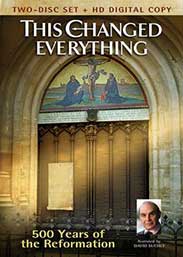"Farewell to those who want an entirely pure and purified church"
This week we anticipate Reformation Sunday, with a quote from Luther about the purified church.

By John H. Armstrong, President and Founder of Act 3 Network
Sometime during my freshman year at the University of Alabama I attended a “house church” which gathered in a living room near campus. Having grown up in a rather traditional church—where we had lovely wood pews, a pulpit, a communion table, a baptistry, a choir, an organ, a pastor and ushers—I found this living-room worship intriguing. I was drawn to this alternative expression of church because it seemed to have more life in it than what I had known in my first eighteen years.
During this time my quest for a “pure and purified church” began in earnest. I wanted to discover a church like the one in the book of Acts. I thought I knew where such a church was not: the church of my childhood. But I was unsure about where it was. Initially, this “house church” in Alabama seemed a lot closer to the New Testament. After all, many of the congregations specifically mentioned in the New Testament met in homes. In 2011 I actually sat and prayed in several first-century house churches in Rome! The simplicity of this space, with a table for the eucharist and running water for baptism, was quite thrilling. I sat and quietly imagined a group of some 30-40 people worshiping the risen Christ here as a church for the very first time in all of human history! Things were simple. At first glance, even “pure.”

The Dura-Europos house church, ca. 232, with chapel area on right. By Heretiq - Own work, CC BY-SA 2.5, https://commons.wikimedia.org/w/index.php?curid=434120
Yet even in their origin, the churches of the first century were never without profound problems. Any study of the epistles of the New Testament will cause serious readers to give up such a romantic notion.
The Reformation was about changing many things. In one sense it was about recovering the gospel of grace. In another it was about seeing afresh the incarnate Christ as Lord at the very center of all life. It was also about the Bible and the belief that every Christian could hear it and read it and encounter Christ on the sacred page. Luther said, “The Bible is alive, it speaks to me; it has feet, it runs after me; it has hands, it lays hold of me.”
Order This Changed Everything.
Christian History Institute takes a thorough look at the Reformation, its causes and effects.
The Reformation was also about the role of priests and the laity; thus it was about the priesthood of all believers. But ultimately it was about reforming the church. How can the visible church, with its life rooted in the preaching of the Word and the sacraments, be reformed? Can it ever become entirely pure?
Sometime after the death of the early Protestant reformers – Luther, Zwingli, Bucer,Calvin, and Melanchthon – a saying developed in Latin that went like this: ecclesia semper reformans, semper reformanda. In simple English, this saying means "the church is always reformed and always reforming.” Regardless of who said it, the idea is very much in keeping with Luther’s notion that there can never be an “entirely pure and purified church.” Real reformation is never attained! It is always a process. The Spirit continues to renew and reform the church in every age.
Martin Luther was right. The church will never be “entirely pure.” But it can and must be reforming by the Word of God. This does not require us to gather in house churches, yet it does mean that every church should continually seek to be faithful to the Gospel and to faithfully follow Christ. This was the spark that ignited the Reformation. It must again ignite our hearts and churches with God-given renewal through grace. May this be our prayer for Reformation Sunday and beyond.
John H. Armstrong is the founder and president of ACT3 Network and a contributing consultant for Christian History Institute.
Join us each Thursday for a fresh look at a quote from the Reformation era! Sign up via our e-newsletter (in the box on the top right) or through our RSS feed (above), or follow us on Facebook for the next year as we celebrate 500 years of Reformation. #RefoThursday




